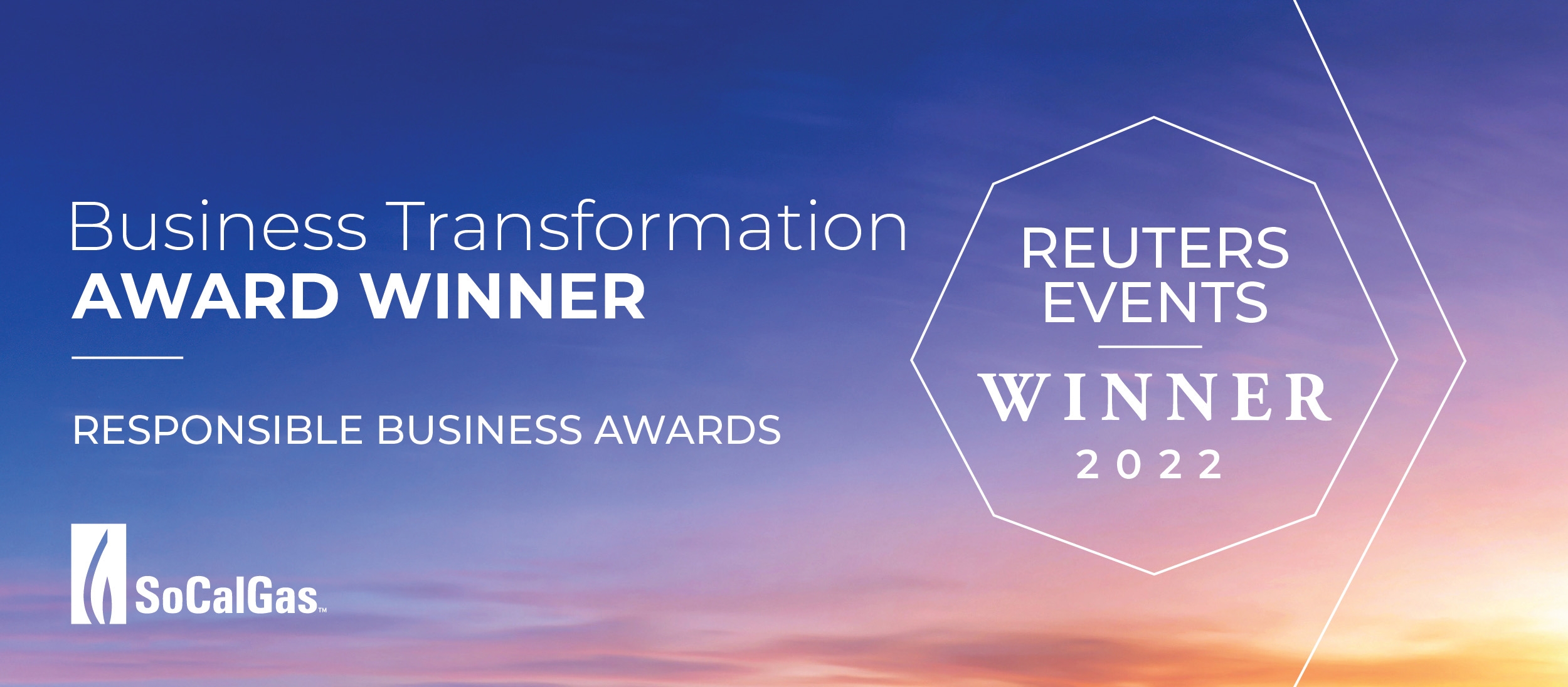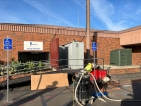
California is America’s largest economy, on pace to overtake Germany as the fourth largest on the planet. Governor Newsom and other state leaders rightfully point with pride to California’s spirit of leadership and innovation as a driver of the state’s success and a model for others to follow.
As one of America’s largest energy infrastructure companies SoCalGas shares that spirit. We are privileged to serve 22 million Californians and proud of our work as an industry leader and innovator in safety, reliability, decarbonization and more.
SoCalGas is honored to have received the 2022 Reuters Business Transformation Award. Among a field of major global companies, SoCalGas was identified as a leader in sustainable business priorities. A cornerstone of this prestigious award is the degree to which the winner’s transformations have the “potential to create positive impact at scale in their sector and beyond.”
SoCalGas is a leader in sustainability with innovations across our business. From the delivery of renewable natural gas to support clean transportation, to powering company facilities with renewable energy, to creating a Customer Council on Decarbonization to help major energy users decarbonize their operations, SoCalGas is advancing its mission to build the cleanest, safest, most innovative energy company in America.
SoCalGas has reduced methane emissions by nearly 40% since 2015 and recently proposed a game changing decarbonization solution, Angeles Link, an energy infrastructure system under development that could deliver reliable green hydrogen at scale to the Los Angeles Basin for use in electric generation and hard-to-electrify sectors.
We are actively developing an industry-leading portfolio of scalable clean fuels demonstration projects with partners from private industry, the US Department of Energy and California Energy Commission, and leading research institutions such as the University of California Irvine and the National Renewable Energy Laboratory. Clean fuels like hydrogen could support decarbonized and reliable electric generation, clean high-heat manufacturing, and would help California reach its zero-emissions vehicle goals.
In recognition of the critical role that clean fuels will play in transforming and decarbonizing energy, recent federal legislation provides $8 billion in federal funds to support hydrogen hubs and another $7 billion for carbon management projects. SoCalGas is actively working to support California in competing for these much-needed resources.
While California is a model for others to follow, to achieve our goals, it’s also important that we learn from others. Twenty-one nations in Europe are repurposing existing natural gas pipelines to provide as much as 70% of the infrastructure needed to build an affordable, interconnected clean hydrogen network.
With overall electricity demand expected to double over the next two decades here in California, leveraging existing energy infrastructure at scale will be critical to accelerating decarbonization, making it more affordable and enabling economic growth.
Beyond infrastructure, SoCalGas’s sustainability leadership shows up in our communities, including a historic goal to invest approximately $50 million in underserved communities over the next five years and purchasing 42% - nearly $1 billion – of all our goods and services from women, minority, LGBT, and persons with disabilities business enterprises in 2021.
We are proud to be recognized by Reuters for making a meaningful difference in our industry, communities, and beyond.

This blog contains statements that constitute forward-looking statements within the meaning of the Private Securities Litigation Reform Act of 1995. Forward-looking statements are based on assumptions with respect to the future, involve risks and uncertainties, and are not guarantees. Future results may differ materially from those expressed or implied in any forward-looking statements. These forward-looking statements represent our estimates and assumptions only as of the date of this blog. We assume no obligation to update or revise any forward-looking statement as a result of new information, future events or other factors.
In this blog, forward-looking statements can be identified by words such as "believes," "expects," “intends,” "anticipates," “contemplates,” "plans," "estimates," "projects," "forecasts," "should," "could," "would," "will," "confident," "may," "can," "potential," "possible," "proposed," "in process," " construct," "develop," “opportunity,” "target," "outlook," "maintain," "continue," “progress,” “advance,” “goal,” “aim,” “commit,” or similar expressions, or when we discuss our guidance, priorities, strategy, goals, vision, mission, opportunities, projections, intentions or expectations.
Factors, among others, that could cause actual results and events to differ materially from those expressed or implied in any forward-looking statement include risks and uncertainties relating to: decisions, investigations, regulations, issuances or revocations of permits and other authorizations, renewals of franchises, and other actions by (i) the California Public Utilities Commission (CPUC), U.S. Department of Energy, and other regulatory and governmental bodies and (ii) the U.S. and states, counties, cities and other jurisdictions therein in which we do business; the success of business development efforts and construction projects, including risks in (i) completing construction projects or other transactions on schedule and budget, (ii) realizing anticipated benefits from any of these efforts if completed, and (iii) obtaining the consent or approval of partners or other third parties, including governmental and regulatory bodies; civil and criminal litigation, regulatory inquiries, investigations, arbitrations and other proceedings, including those related to the natural gas leak at the Aliso Canyon natural gas storage facility; changes to laws and regulations; cybersecurity threats, including by state and state-sponsored actors, to the energy grid, storage and pipeline infrastructure, information and systems used to operate our businesses, and confidentiality of our proprietary information and personal information of our customers and employees, including ransomware attacks on our systems and the systems of third-parties with which we conduct business, all of which have become more pronounced due to recent geopolitical events and other uncertainties, such as the war in Ukraine; failure of our counterparties to honor their contracts and commitments; actions by credit rating agencies to downgrade our credit ratings or to place those ratings on negative outlook and our ability to borrow on favorable terms and meet our debt service obligations; the impact of energy and climate policies, laws, rules and disclosures, as well as related goals and actions of companies in our industry, including actions to reduce or eliminate reliance on natural gas generally and any deterioration of or increased uncertainty in the political or regulatory environment for California natural gas distribution companies and the risk of nonrecovery for stranded assets; the pace of the development and adoption of new technologies in the energy sector, including those designed to support governmental and private party energy and climate goals, and our ability to timely and economically incorporate them into our business; weather, natural disasters, pandemics, accidents, equipment failures, explosions, acts of terrorism, information system outages or other events that disrupt our operations, damage our facilities and systems, cause the release of harmful materials, cause fires or subject us to liability for damages, fines and penalties, some of which may be disputed or not covered by insurers, may not be recoverable through regulatory mechanisms or may impact our ability to obtain satisfactory levels of affordable
insurance; inflationary and interest rate pressures, volatility in commodity prices, our ability to effectively hedge these risks, and their impact, as applicable, on our cost of capital and the affordability of customer rates; the availability of natural gas and natural gas storage capacity, including disruptions caused by limitations on the withdrawal of natural gas from storage facilities; the impact of the COVID-19 pandemic on capital projects, regulatory approvals and the execution of our operations; changes in tax and trade policies, laws and regulations, including tariffs, revisions to international trade agreements and sanctions, such as those that have been imposed and that may be imposed in the future in connection with the war in Ukraine, which may increase our costs, reduce our competitiveness, impact our ability to do business with certain counterparties, or impair our ability to resolve trade disputes; and other uncertainties, some of which are difficult to predict and beyond our control.
These risks and uncertainties are further discussed in the reports that the company has filed with the U.S. Securities and Exchange Commission (SEC). These reports are available through the EDGAR system free-of-charge on the SEC's website, www.sec.gov, and on Sempra’s website, www.sempra.com. Investors should not rely unduly on any forward-looking statements.
Sempra Infrastructure, Sempra Texas, Sempra Mexico, Sempra Texas Utilities, Oncor Electric Delivery Company LLC (Oncor) and Infraestructura Energética Nova, S.A.P.I. de C.V. (IEnova) are not the same companies as the California utilities, San Diego Gas & Electric Company or Southern California Gas Company, and Sempra Infrastructure, Sempra Texas, Sempra Mexico, Sempra Texas Utilities, Oncor and IEnova are not regulated by the CPUC.














